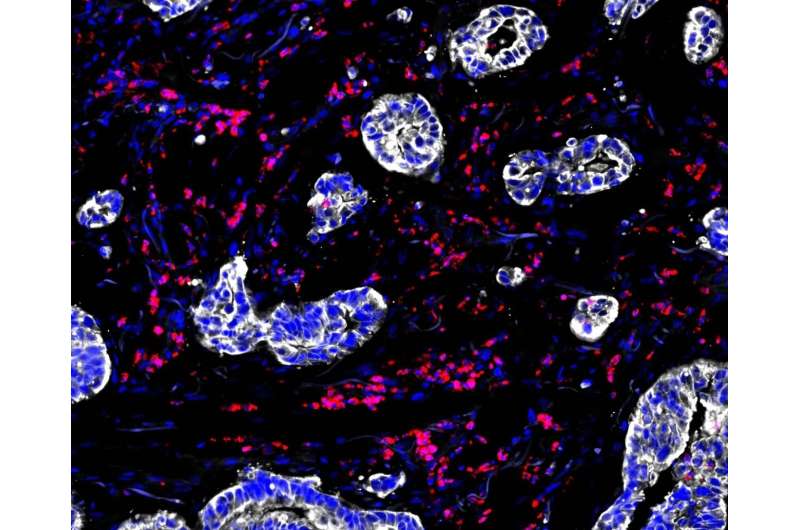This article has been reviewed according to Science X's editorial process and policies. Editors have highlighted the following attributes while ensuring the content's credibility:
fact-checked
peer-reviewed publication
trusted source
proofread
Cancer therapy bexmarilimab awakens immune cells to attack tumors that have avoided detection, research finds

Researchers at the University of Turku, Finland, have uncovered how the new bexmarilimab therapy alters the function of immune cells so that they can infiltrate the tumor in cancer patients who do not respond to any other current therapies.
Bexmarilimab is a new cancer drug developed by Faron Pharmaceuticals in Turku, Finland. The research was published in the journals Cell Reports Medicine and Cancer Immunology Research.
Cancer immunotherapy utilizes the body's own defense machinery, the immune system, to fight against cancer. Novel immunotherapies are being developed to help patients whose immune cells fail to attack cancer even with the aid of currently available therapies.
One potential future cancer therapy, bexmarilimab, changes macrophage behavior to promote anti-tumor immune defense. Macrophages are highly plastic immune cells that cancer can utilize to avoid detection by the immune system. Docent Maija Hollmén's research group at the InFLAMES Research Flagship at the University of Turku in FInland has investigated how bexmarilimab therapy alters immune cell function within patient tumors.
"In a clinical trial for advanced-stage cancer, bexmarilimab therapy was well tolerated and stabilized disease progression in subsets of patients. In patients benefitting from the therapy, we observed tumor-associated macrophage and lymphocyte activation as well as induction of interferons, which are all important signs of anti-tumoral immune defense," says Dr. Hollmén.
The study utilized a novel spatial transcriptomics method that allowed the researchers to investigate changes in immune cell gene expression in a spatial context of patient tissue samples.
Efficacy in tumors resistant to current immunotherapies
Individual cancer patients differ greatly in their sensitivity to immunotherapies, as tumors can resist immune attacks to varying degrees. Therefore, it's important to identify tumor types where a novel immunotherapy has the highest efficacy.
By treating patient-derived cancer cells and immune cells with bexmarilimab in cell cultures, Hollmén's group could study in detail how individual immune cells react to bexmarilimab.
"We observed similar immune system activation in patient-derived cell cultures as we saw within patient tumors: bexmarilimab stimulates the macrophages, which can then activate T lymphocytes that are proficient in killing cancer cells. Successful treatment therefore depends on the cooperation of several immune cell types," describes Jenna Rannikko, who is the first author of the related research articles.
The similarities between the clinical study and patient-derived cell cultures encouraged the group to investigate why bexmarilimab lacks efficacy in some patients. They discovered that macrophage exposure to interferons prevents bexmarilimab from activating them.
"This is highly significant, as it means that bexmarilimab would be most efficacious in tumors where currently available immunotherapies work poorly. Those tumors have lower levels of interferons. After bexmarilimab-induced anti-tumoral immunity, these tumors could become sensitive to currently available immunotherapies as well," concludes Rannikko.
More information: Jenna H. Rannikko et al, Bexmarilimab-induced macrophage activation leads to treatment benefit in solid tumors: The phase I/II first-in-human MATINS trial, Cell Reports Medicine (2023). DOI: 10.1016/j.xcrm.2023.101307
Jenna H. Rannikko et al, Bexmarilimab Activates Human Tumor-Associated Macrophages to Support Adaptive Immune Responses in Interferon-Poor Immune Microenvironments, Cancer Immunology Research (2023). DOI: 10.1158/2326-6066.CIR-23-0350



















